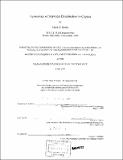Economics of seawater desalination in Cyprus
Author(s)
Batho, Mark P. (Mark Peter), 1968-
DownloadFull printable version (10.75Mb)
Other Contributors
Massachusetts Institute of Technology. Dept. of Civil and Environmental Engineering.
Advisor
David H. Marks.
Terms of use
Metadata
Show full item recordAbstract
The Republic of Cyprus is currently suffering from severe drought conditions. This is not uncommon to Cyprus, as they frequently experience three to four year droughts every decade. They are currently in the middle of their fourth year of drought. Some Cypriots believe that the main reason for water shortages is due only to low levels of rainfall (average rainfall in Cyprus is 500 mm per year, and less than 400 mm per year is considered a drought year). It is not disputed that this is part of the problem. However, my belief, along with many Cypriots is that the biggest part of the problem is one of water allocation. Agriculture in Cyprus contributes approximately 5% to the GDP, yet consumes 75% of available water in Cyprus. The remainder of water is left for the sector of the economy that produces the remaining 95% of the GDP, of which municipal, industrial and tourist uses are of greatest importance. One may ask why this is so. According to some Cypriots, it is because Cypriot farmers are thought to be a politically influential group, and that they farm more as a way of life, rather than to earn a living directly. Others discount this "way of life" theory. What is important, however is that farming is using a lot of water and is contributing very little to the GDP of Cyprus. For example, Citrus crops grown within the Southern Conveyor System (a large network of water conveyance pipes stretching for over 100 km in the southern part of the island) (see Figure 3, page 16) uses approximately 21% of all available water available in Cyprus, and without Government subsidies would not show profitability. Although there may be some aesthetic value in citrus groves one must ask if it is economically and environmentally justified to continue farming citrus. To do so means building seawater desalination plants that contribute 5.0 to 6.0 kg of CO 2, a greenhouse gas, to the atmosphere per m3 of water produced by desalination, along with the cost of the water nearing one US dollar per m3 . Desalination is a painful solution to Cyprus' water shortage that could be otherwise be addressed with a proper water allocation scheme.
Description
Thesis (M.Eng.)--Massachusetts Institute of Technology, Dept. of Civil and Environmental Engineering, 1999. Includes bibliographical references (p. 48-52).
Date issued
1999Department
Massachusetts Institute of Technology. Department of Civil and Environmental EngineeringPublisher
Massachusetts Institute of Technology
Keywords
Civil and Environmental Engineering.